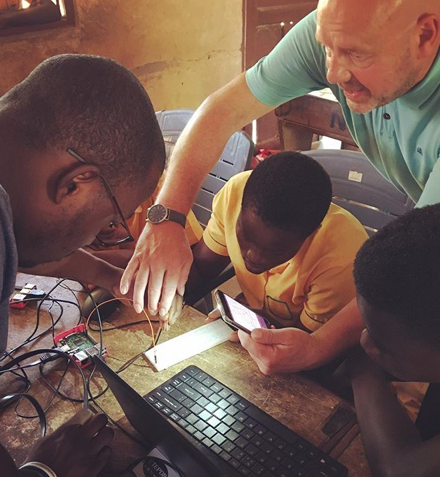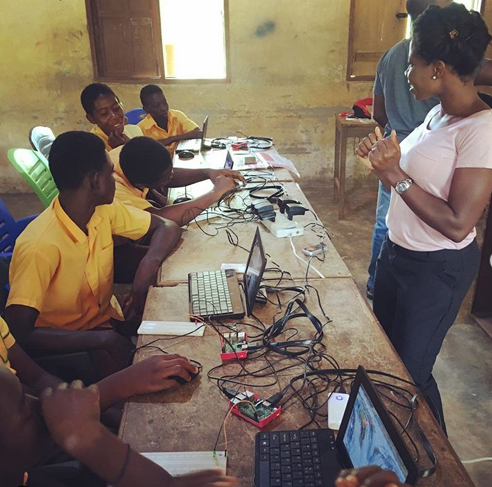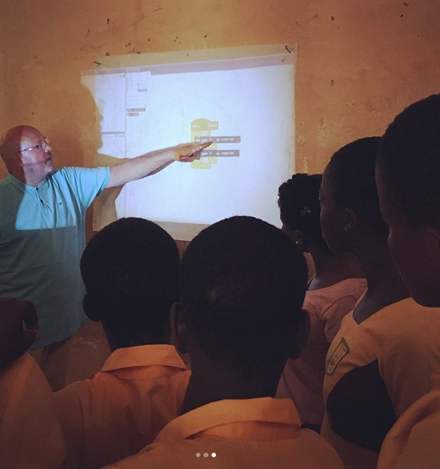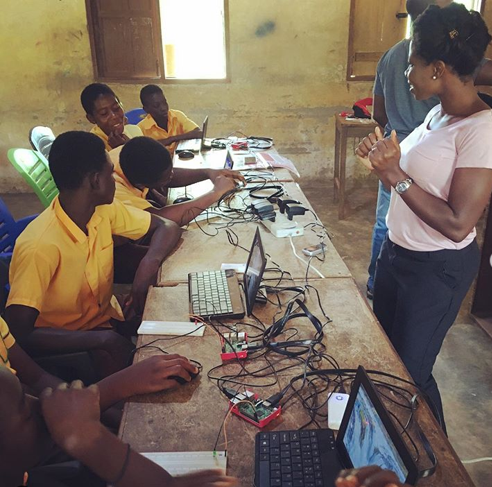How the Raspberry Pi opens the digital gate for Ghana ++
“My hands were shaking – I was so excited!” – one feedback from a young student after her first session with the Raspberry Pi computer. For some pupils, aged between 13 and 16, it was the first time to touch a computer! But digital education is key for Africas future. Moreover, it can also serve as a bridge to develop soft skills like critical thinking and teamwork in a practical setup.
Still, IT classes in rural schools in Ghana are done with chalkboards and without practical experience. The picture of a dedicated teacher, who painted a fully detailed Microsoft Office interface on the chalkboard went viral via media like CNN. It became a symbol for the lack of equipment and ressources of public schools in Africa. Most schools and families are not even equipped with a single computer. A sharp contrast to the requirements of the modern job market and a missed chance for talents.
With the support of the Codingschule Düsseldorf, an impressive initiative to train the youth in Germany how to code, we started a field test on 2 local schools in Kokrobite. Our Senior Volunteer from Germany, Heiko, dedicated 6 weeks of his time to run the training together with the local team. He brought not only 20 years of IT experience from HP, but also a set of Raspberry Pi computers including advanced equipment like breadboards and power banks. The equipment turned out to be ideally suited to the challenging conditions on Ghanaian schools with its heat, dust and power cuts.
>>> Check out our CLASSROOM VIDEO how our first mini-IT-lab looked like in reality! <<<
The team followed the curriculum of the Raspberry Pi Foundation and some great open source communities like CODE IT. The training was challenging for the pupils and demonstrated the need for an extensive follow-up training in small groups. With 8 pupils in one group and 2-3 instructors, the level of explanation and interaction was intense and very effective. This ratio was necessary to build up quickly skills like critical thinking and logical reasoning which are key to master the curriculum. The tangible progress of the pupils proves the need and effectiveness of the training and encouraged us to proceed. The students join the program even on weekends or during vacation – and the demand is growing.
Thus, the training will be continued in rotating, small groups at our partner schools. The mid-term goal is to extend the activity to more schools in our region. The team is excited about the progress and is grateful for the donations done by Heiko and the Codingschule Düsseldorf, which made this pilot possible.
Quick Facts:
-
- Successful test of Raspberry Pi computers on 2 basic schools with >30 pupils (13-16 yrs)
- Training included basic computer literacy, internet usage, basic coding (SCRATCH) and breadboarding
- The very structured and challenging curriculum of the Raspberry Pi foundation is open source and a great starting point for this age group – it also empowers instructors without coding knowledge to quickly pick up
- The equipment is robust enough for Africa and suitable for the youth
- Costs per computer of 100 USD (incl. equipment) and the extensive, collaborative open-source-community make large-scale rollouts achievable – we are currently applying to a fundraising accelerator program to finance this rollout. We will keep you posted!



